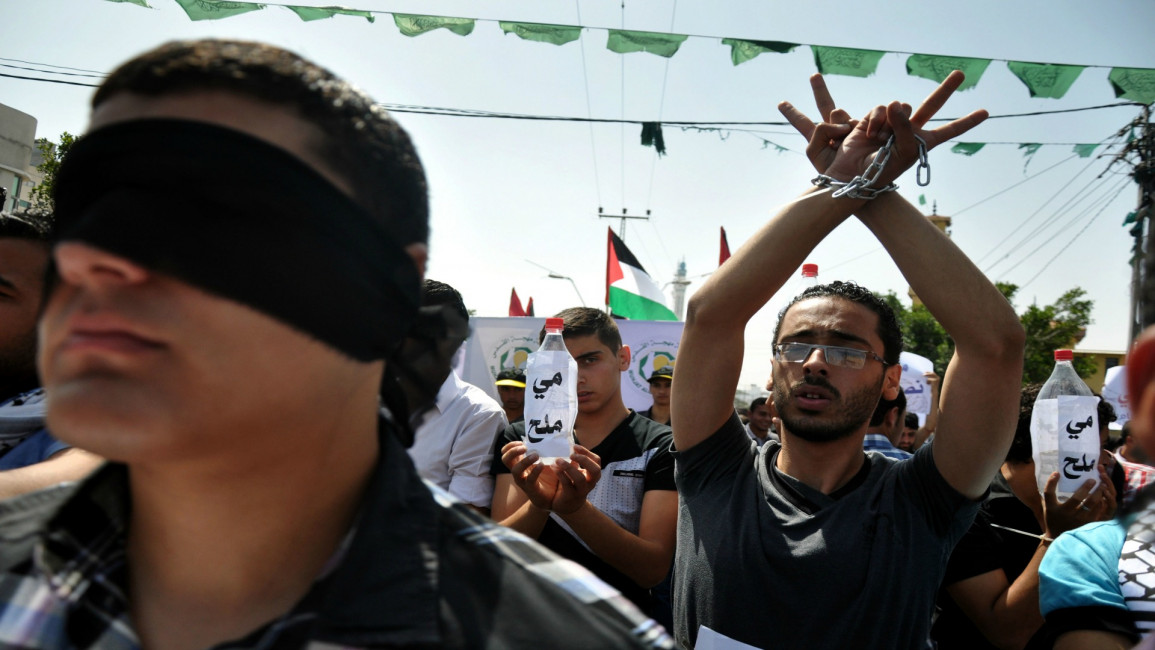
Defiance in face Israeli humiliation: al-Qiq's hunger strike
Israel’s obsession with obliterating the various forms of Palestinian resistance has, for several weeks now, been evident in its treatment of Palestinian journalist and administrative detainee Mohammed al-Qiq.
According to Addameer, he was arrested from his home in Ramallah last November, and was subjected to torture during his interrogation, shackled in stress positions and threatened with both sexual harassment and administrative detention.
Predictably Israel utilised its clauses of incitement, involvement in military activities and affiliation with unspecified “others” as reasons for al-Qiq’s detention.
However, Israel has eliminated the context of the Jerusalem Intifada, which shows that al-Qiq’s arrest forms part of a wider crackdown against Palestinians in the West Bank.
Humiliating measures
Since the commencement of his hunger strike, four days into the brutal interrogation, al-Qiq faced intimidating behaviour, including pressure to end the strike and offers by an Israeli intelligence commander to compromise the hunger strike by agreeing to release after the renewal of one administrative detention order.
As al-Qiq’s health deteriorates, with several news outlets and human rights organisations, including Addameer, reporting that he is in a life-threatening condition, Israel has 'suspended' the administrative detention order, in a bid to convince al-Qiq to abandon his protest.
 |
Collective punishment based upon fabricated claims of incitement allows Israel a wide berth through which to act violently. |  |
Since a suspension does not entail complete revocation, Israel’s move is both humiliating and condescending, revealing the wilful practice of bringing a hunger striker close to death, offering a belated compromise and retaining the authority to impose the same administrative detention order once the prisoner is in better health.
According to Ma’an, in the words of Qadura Fares, Head of the Palestinian Prisoners’ Society, while al-Qiq is unlikely to accept the compromise, he might accept medical treatment while seeking a better solution.
Later, however, Ma’an reported that al-Qiq rejected the administrative detention suspension, insisting that his hunger strike will continue until the detention order is cancelled.
The Israeli deception was described as “an attempt to undermine public and international opinion that is critical of Israeli policy.”
Al-Qiq’s hunger strike has garnered considerable attention, given reports earlier in January that medical personnel had embarked upon force-feeding.
The Palestinian Centre for Human Rights’ press release explicitly states that on January 12, “Israeli forces applied the force-feeding law against the administrative detainee Mohammed al-Qiq.”
Addameer, on the other hand, has specified forced treatment having been inflicted upon al-Qeiq.
The WMA Declaration of Malta on Hunger Strikers explicitly states that “Hunger strikers should not be forcibly given treatment they refuse. Forced feeding contrary to an informed and voluntary refusal is unjustifiable. In either scenario, it is clear that Israel has, once again, violated human rights, without any repercussions for its impunity.
The passing of the force-feeding law provides an exceptional insight into Netanyahu’s twisted logic. Justifying Israel’s human rights violations by claiming to protect the rights of prisoners on hunger strike is an example of how colonial violence manages to avoid the pitfalls usually associated with such practices.
In reality, the law is an additional effort in Israel’s efforts to annihilate Palestinian resistance, not only as the means through which to combat the discriminatory practice of administrative detention, but also especially within contexts such as the Jerusalem Intifada, which cannot be contained by assigning blame of initiation to any Palestinian resistance faction.
Collective punishment based upon fabricated claims of incitement allows Israel a wide berth through which to act violently, as well as relentlessly indulge in severe forms of torture in several cases, particularly through administrative detention and its ramifications.
A hypocritical international response
As is customary, the United Nations has issued its belated response, timing it exactly when al-Qiq’s health was reported to have taken a drastic turn for the worst.
Robert Piper, UN Coordinator for Humanitarian Assistance and Development Aid issued a statement claiming he is “deeply concerned about the continued practice of administrative detention in Israeli jails and detention centres.”
Piper also stated that “all administrative detainees - Palestinian or Israeli - should be charged or released without delay.”
As seen in this statement, the language used by the UN official already dilutes the purpose of reprimanding Israel.
Attempting to inject a sense of equivalence between Palestinian civilians and the Israeli settler population is already an abhorrent gesture.
Exploiting al-Qiq’s hunger strike protesting administrative detention by ushering in a calculated reminder regarding Israel’s short-lived decision to apply administrative detention to the suspects arrested in connection with the Duma arson attack portrays an intensely condescending attitude.
Through such a statement, the UN has clearly reasserted its unflinching position of safeguarding Israel’s violence from scrutiny.
Ramona Wadi is an independent researcher, freelance journalist, book reviewer and blogger specialising in the struggle for memory in Chile and Palestine, colonial violence and the manipulation of international law.
Opinions expressed in this article remain those of the author and do not necessarily represent those of The New Arab, its editorial board or staff.




